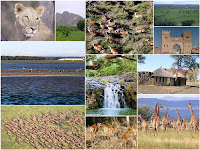Juba, South Sudan and lessons from Rwanda
 |
| Juba - click on map to enlarge |
Those planning, administering and managing Juba, on the White Nile, have a most daunting task. At the same time, with South Sudan awash in oil and the city being built from almost nothing , they can build the city into whatever they want it to be. Properly planned and managed, Juba can be a clean, organized and sustainable metropolis. Left un-managed and in the hands of corrupt officials, the city will be just another, poorly planned, crowded (with mainly poor people), dirty and an insecure crime ridden African city. A sample of what is being reported about the city: today the periphery of Juba city is more violent than during the war and too insecure for cultivation. In the middle of town, markets are full of food and other supplies, but prices are high, as most food comes from Uganda and Kenya. The outskirts are overcrowded, posing serious health and sanitation risks such as cholera outbreaks.
The government of South Sudan
Luckily and very fortunately for Rwanda, it had one strong thing going for it: an enlightened, forward looking leadership that cares deeply for its people. A leadership, that, despite many of its short-comings has done what very few, thought possible. Rwanda has, so far, avoided the worst. Kigali is shining. Can the Southern Sudanese leadership do the same for their people? Can they do the same for Juba or whatever site they decide for their capital? It is not what problems or resources a family or a society or a nation have that matter; it is the kind of leadership that a family or a society or nation has, that most matters.
More on Juba:
+ Wikitravel
+ TIME
+ MYsinchew
+ VOA
+ Yahoo News
+ Google News
+ South Sudan Nation
+ Google Map


